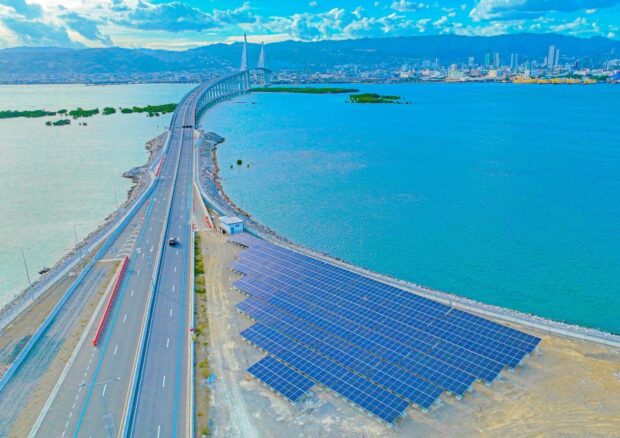PH longest bridge now powered by P60-M hybrid solar farm

SUSTAINABLE OPERATION | A P60-million on-grid and hybrid solar farm has been set up at the foot of the 8.9-kilometer Cebu-Cordova Link Expressway, which will energize the bridge and ensure the sustainable operation of the country’s longest bridge and Cebu’s newest landmark. (Photo from the Cebu Cordova Link Expressway Corp.)
CEBU CITY, Cebu, Philippines — The Cebu-Cordova Link Expressway (CCLEX), the picturesque third bridge linking mainland Cebu to Mactan Island and now turning to be a new landmark here, is going solar.
The corporation that operates the toll bridge has announced the completion of its P60-million on-grid and hybrid solar farm located near the foot of the bridge landing in Cordova town on Mactan Island.
Some 862 photovoltaic panels were installed strategically in three different areas at the 8.9-kilometer modern toll expressway, the longest bridge structure in the country.
The CCLEX solar farm generates a total of 50,400 kilowatt hours of electricity per month, which has been tapped for the power needs of the bridge starting April.
Significant milestones
“It will supply the expressway’s daytime power requirement for roadway lights, traffic control room, closed-circuit television cameras, road weather information system, variable message signs and toll plaza,” said Cebu Cordova Link Expressway Corp. (CCLEC) in a press statement released on March 31.
The solar farm is expected to gain carbon emission savings of 237,082 kilograms or the equivalent of 7,076 trees planted, the corporation said.
CCLEC president and general manager Allan Alfon explained the need to tap renewable energy to power the day-to-day operation of its 8.9-km modern toll expressway.
“The completion of our solar farm is a significant milestone in our drive toward being more sustainable in our operations by reducing our carbon footprint and promoting the use of clean, renewable energy,” he said.
“Setting aside a significant area for this project is staying true to our mission of bringing good life to people, not only through our infrastructure developments but also through sustainable practices,” he added.
Apart from the solar farm, CCLEC also installed 13 oil interceptors along the expressway, a P60.7-million investment to prevent contaminants from polluting the sea.
These interceptors, CCLEC said, collect vehicle grease and oil that spilled on the road and were washed away by rain.
CCLEC said they are also in the works of other sustainable projects such as a sewage treatment plant and a noise barrier system.
The CCLEX was seen to not only ease traffic congestion in Metro Cebu but to also spark socioeconomic development in the province.
The expressway is a project of CCLEC in partnership with the local governments of Cebu City and Cordova.
CCLEC is a wholly owned subsidiary of Metro Pacific Tollways Corp., the toll road arm of Metro Pacific Investments Corp., a publicly listed infrastructure holding company and a member of the MVP Group of Companies.